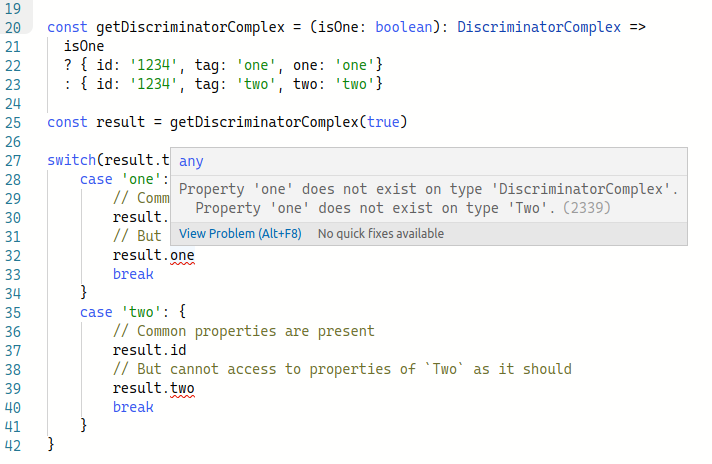Example to reproduce issue with discriminators on ferdikoomen/openapi-typescript-codegen #985
Given a oneOf schema consisting of two refs, each of one has a type property
used as discriminator:
components:
schemas:
AorB:
type: string
enum:
- a
- b
A:
type: object
required:
- a
- tag
properties:
a:
type: string
tag:
'$ref': '#/components/schemas/AorB'
B:
type: object
required:
- b
- tag
properties:
b:
type: string
tag:
'$ref': '#/components/schemas/AorB'
DiscriminatorSimple:
discriminator:
propertyName: tag
mapping:
a: '#/components/schemas/A'
b: '#/components/schemas/B'
oneOf:
- '$ref': '#/components/schemas/A'
- '$ref': '#/components/schemas/B'The following types are generated:
// DiscriminatorSimple.ts
import type { A } from './A';
import type { B } from './B';
export type DiscriminatorSimple = (A | B);
// A.ts
export type A = {
'a': string;
tag: 'a';
};
// B.ts
export type B = {
'b': string;
tag: 'b';
};The discriminators are handled correctly in this case, each of the memebrs of
DiscriminatorSimple have the literal type used in their discriminator property
(tag).
Another example with oneOf consisting of two refs, however those refs are not
simple objects but composed with allOf by extending from a base ref and adding
some props of their own. The discriminator property in this case is part of the
base ref, however the same result happens if the discriminator is present in
each of the refs instead of the base one.
components:
schemas:
DiscriminatorType:
type: string
enum:
- one
- two
Base:
type: object
required:
- id
- tag
properties:
id:
type: string
tag:
'$ref': '#/components/schemas/DiscriminatorType'
One:
allOf:
- '$ref': '#/components/schemas/Base'
- type: object
required:
- one
properties:
one:
type: string
Two:
allOf:
- '$ref': '#/components/schemas/Base'
- type: object
required:
- two
properties:
two:
type: string
DiscriminatorComplex:
discriminator:
propertyName: tag
mapping:
one: '#/components/schemas/One'
two: '#/components/schemas/Two'
oneOf:
- '$ref': '#/components/schemas/One'
- '$ref': '#/components/schemas/Two'That results in the following generated code:
// DiscriminatorType.ts
export type DiscriminatorType = 'a' | 'b';
// Base.ts
import type { DiscriminatorType } from './DiscriminatorType';
export type Base = {
id: string;
tag: DiscriminatorType;
};
// DiscriminatorComplex.ts
import type { One } from './One';
import type { Two } from './Two';
export type DiscriminatorComplex = (One | Two);
// One.ts
import type { Base } from './Base';
export type One = (Base & {
one: string;
});
// Two.ts
import type { Base } from './Base';
export type Two = (Base & {
two: string;
});Since the discriminator property (tag) is in base, instead of each element of
the DiscriminatorComplex type having it's own property with the literal type,
like the working example, it is not possible to discriminate.
